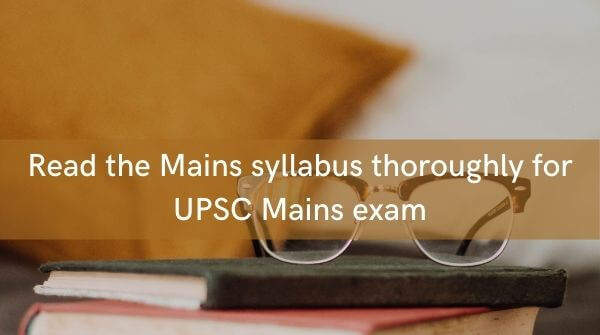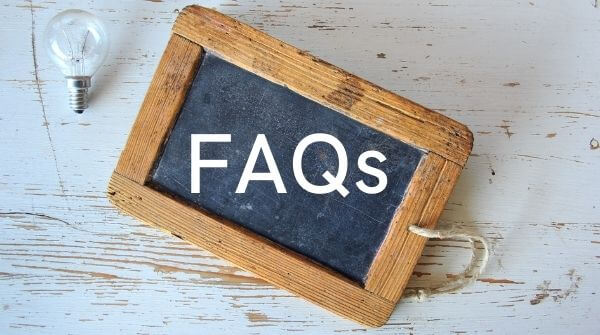The Civil Services Examination is considered one of the most difficult exams to crack in India. The Union Public Service Commission is the central agency responsible for conducting exams to various posts in the government of India. The IAS Mains syllabus is vast and so takes a lot of time and patience to finish. Also, the UPSC syllabus for Mains exam is prepared such that you develop a generalist approach towards the exam in the end. We will be talking about the UPSC CSE Mains syllabus and UPSC Mains syllabus pdf. Also, we will provide information on what books you will need to purchase, tips to crack the exam and how to start your Mains journey.
[speaker-mute] [/speaker-mute]UPSC Mains Exam – IAS mains syllabus

The UPSC-CSE consists of three stages of exam – Prelims, Mains, and the Interview/Personality test. The Prelims paper is of qualifying nature whereas the Mains and Interview decide your selection. After clearing Prelims. it becomes extremely necessary that you polish your Mains preparation. But, you have to begin your IAS Mains preparation as early as you start preparing for Prelims. Also, the Mains paper requires a dynamic outlook with critical thinking and analytical ability reflected in your answer.
Students often say that the UPSC-CSE Mains syllabus is so vast that it takes quite a bit of time to grasp the demand of the paper. Here, it becomes key to get the syllabus 100% before you start preparing. This is because the UPSC mains syllabus is comprehensive and involves an overall outlook. We will further simplify the mains syllabus from all the angles.
By the time you finish this article, you will know what exactly you have to study and how you should go about it for the Mains papers. So, in this article, we will talk all about the UPSC mains exam – IAS mains syllabus, Mains exam pattern, and Study material. We will also guide you through the tips and tricks to clear the Mains exam.
UPSC syllabus for Mains exam
The Civil Services (Mains) Examination is a subjective type paper and the marks are added to calculate your total score. So, the mains marks will play a key role in deciding your rank in the exam. also, note that only your Mains and Interview marks will decide your ranking. Let us further discuss the UPSC syllabus for Mains exam. You will have to write answers to the questions with a critical approach.
The Mains exam consists of 9 papers –
- Paper A – Compulsory Indian language (Qualifying in nature)
- Paper B – English (Qualifying in nature)
- Paper-I – Essay
- Paper-II – General Studies – I
- Paper-III – General Studies – II
- Paper-IV – General Studies – III
- Paper-V – General Studies – IV
- Paper-VI – Optional subject paper I
- Paper-VII – Optional subject paper II
| Paper | Subject | Duration | Total marks |
| Paper A | Compulsory Indian language | 3 hours | 300 |
| Paper B | English | 3 hours | 300 |
| Paper I | Essay | 3 hours | 250 |
| Paper II | Indian Heritage & Culture, History & Geography of the World & Society | 3 hours | 250 |
| Paper III | Governance, Constitution, Welfare Initiatives, Social Justice & International Relations | 3 hours | 250 |
| Paper IV | Technology, Economic Development, Agriculture, Biodiversity, Security & Disaster Management | 3 hours | 250 |
| Paper V | Ethics, Integrity & Aptitude | 3 hours | 250 |
| Paper VI | Optional subject paper I | 3 hours | 250 |
| Paper VII | Optional subject paper II | 3 hours | 250 |
Also, you can download the UPSC Mains syllabus pdf from the official website of UPSC.
Study Material – UPSC CSE Mains syllabus
You will need these books to cover the IAS Mains syllabus –

General Studies – I
History
- History of Medieval India by Satish Chandra
- Ancient India by R.S Sharma
- An Introduction to Indian Art Part 1: Class XI
- India’s Struggle for Independence by Bipan Chandra
- India after Independence by Bipan Chandra
- Class X NCERT – The Story of Civilization, Part 2 by Arjun Dev
- Class XII NCERT – Contemporary World History
Geography
- Class XI NCERT – India People and Economy
- Class XI NCERT – India: Physical Environment
- World Geography – Majid Husain
- Class XII NCERT – Fundamentals of Physical Geography
- Class XII NCERT – Fundamentals of Human Geography
- Oxford Atlas
- Certificate Physical and Human Geography – G C Leong
General Studies – II
Polity and International Relations
- Constitution of India at Work (Class XI) NCERT Publication
- Indian Polity by M. Laxmikanth
- Introduction to the Constitution of India by DD Basu (Optional)
- Ethics in Governance, ARC Report
- India’s Foreign Policy Since Independence by V.P. Dutt
Gen. Studies – III
Economy
- Indian Economic Development XI Standard NCERT
- Introductory Macro Economics XII Standard NCERT
- Indian Economy by Ramesh Singh
- Economic Survey
Science and Technology
- Class VIII, IX, X Standard NCERT Biology
General Studies – IV
Ethics, Integrity & Aptitude
- Ethics in Governance, ARC Report
- Lexicon by Chronicle Publications
Current Affairs
- The Hindu Newspaper
- Indian Express (Optional)
- Yojana/Kurukshetra magazine to cover current affairs and other remaining topics like Governance, Developmental Issues, Society, Ecology, and Environment, etc.
For Compulsory Indian language, English, and Essay paper, read as many essays you can and practice sample papers or mock tests.
Optional Papers
These are 26 available optional papers that you can choose from –
- Agriculture
- Animal Husbandry and Veterinary Science
- Anthropology
- Botany
- Chemistry
- Civil Engineering
- Commerce and Accountancy
- Economics
- Electrical Engineering
- Geography
- Geology
- History
- Law
- Management
- Mathematics
- Mechanical Engineering
- Medical Science
- Philosophy
- Physics
- Political Science and International Relations
- Psychology
- Public Administration
- Sociology
- Statistics
- Zoology
- Literature of any one following languages: Assamese, Bengali, Bodo, Dogri, Gujarati, Hindi, Kannada, Kashmiri, Konkani, Maithili, Malayalam, Manipuri, Marathi, Nepali, Oriya, Punjabi, Sanskrit, Santhali, Sindhi, Tamil, Telugu, Urdu, English
You can also download the optional paper syllabus from the official website of UPSC. Read this article to know why IAS Exam is considered the toughest in India.
How to prepare for UPSC Mains w.r.t. IAS mains syllabus
The best time to start CSE preparation is at the earliest. This gives you time to analyze the syllabus and prepare a study chart to follow for the rest of the journey. Also, you can download the UPSC Mains syllabus pdf for free from different websites. The UPSC syllabus for Mains exam can be smartly covered in the following ways –
Syllabus – UPSC Mains Syllabus
Read the syllabus carefully because this is the door to the world of UPSC and the preamble to what UPSC seeks from you. If possible, Learn the syllabus by heart so you do not have to look at it again and again.
Previous Year Questions
Then, analyze the previous year Question papers. This will help you to understand what UPSC wants you to study and what might be asked in the next exam. Moreover, you get a taste of the examiner’s mindset. You can download Previous Year Questions here.
Daily Newspaper Reading

Reading the newspaper daily is a must. Read ‘The Hindu’ and Indian Express (if you have time). Prepare notes as you read because it will help you in revising in the least amount of time.‘The Hindu’ analysis.
NCERTs
These books are government- sanctioned and provide the base for UPSC preparation. UPSC also sometimes asks direct questions from NCERTs. Finish them first and then move on to advanced level books. You can also download NCERTs for free.
Reference Books + Magazines

Once you are done with NCERTs (static portion), put your hands on advanced books. Eg. Polity by M. Laxmikanth. Read magazines like Yojana or Kurukshetra to supplement your studies.
Optional Paper
The optional paper plays a huge role in upping your marks. So, if you are really good in the subject, you will be able to score high marks. So, be wise in choosing this paper. Talk to friends and teachers and also visit coaching institutes to understand the scope of the specific paper. Also, make sure that you do not choose an optional because a lot of people are choosing it. Go for it only if you have the interest to learn and explore it.
Note-making
Always prepare your Prelims and Mains notes together. A comprehensive approach (Prelims + Mains) note-making strategy will save time and increase efficiency. UPSC demands a holistic approach. So, your strategy should also be comprehensive.
Mock tests
You should never avoid this step. Appear in mock tests as many times you can because it is the only way that will tell you how you are performing. Your performance in these tests will prove whether you are going in the right direction or you have to change your strategy. Mock tests are key to UPSC Mains preparation.
Tricks to clear UPSC Mains – Mains Syllabus for UPSC Exam
Every serious IAS aspirant works day and night to clear through the UPSC exam. But, only a few get selected. The first reason being lakhs of students appearing for limited seats. Secondly, hard work does not suffice. You need smart work to secure yourself a position in the final list. We are sharing a few tricks with you so you increase your probability of success. You can download the UPSC Mains syllabus pdf and follow these tricks thereafter. Here we go –
Newspaper
If you do not have the habit of reading a newspaper, this will be a bit difficult for you in the beginning. You do not have to read every news in the paper because many news items are not important from the UPSC point of view. So, follow coaching websites for daily news and editorial analysis. Consequently, you will be able to do a proper reading of the important topics by yourself.
NCERTs
Finish the NCERTs first. This will save you tons of time as you will understand advanced books at a faster rate. Do not skip these even if somebody who has cleared the exam asks you to do so. It is always safe to be prepared despite what others tell you.
Government websites
Supplement your notes with material from govt. websites like that of UPSC, Yojana, etc.
Minimum books
Read 1-2 books for every subject/topic and revise those books again and again. So, do not waste time reading multiple books for the same subject. You will only waste your time.
Notes

Prepare notes for every paper rather than for every subject because this is an important tip for UPSC Mains preparation. You will be amazed at how you remember better and present high-quality answers.
Practice is the key
Practice practice practice!!! This cannot be stressed enough as revision and practicing answer writing will lead to your success. The more you write, the faster you will think and produce in the exam. As the saying goes, “Practice makes a man perfect”.
So, prepare a daily time table and follow it regularly. Also, exercise daily to keep your body and mind healthy and eat right. A combination of all these will prepare you to become the future IAS/IPS officers. You can also read about how to prepare for IAS exam at home here.
Also, read about tips to choose the best coaching for IAS exam.
Frequently Asked Questions – UPSC-CSE Mains syllabus

Since you can score really high in your optional paper, you must be thorough with this paper. So, give time and prepare quality notes beforehand and keep revising at regular intervals. Next, pay attention to current affairs because a major portion of your answers can be filled with facts from the newspaper. Rest, you can pick the subjects one by one and finish accordingly.
That would be walking on a tightrope. You should not keep an important part of your UPSC journey till the last. You get only 3 months before the Mains exam. The smartest way to prepare for Mains is to make comprehensive notes (Prelims+Mains). This method ensures that both the exams are taken care of when you still have time. Also, earlier preparation keeps room for maximum revision, which should be the main focus as an IAS/IPS aspirant.
You can visit the UPSC official website for the UPSC Mains syllabus pdf.
COVID-19 Update | UPSC Mains Syllabus
The coronavirus pandemic has had the entire world at its fingertips. It has affected not only the economy but also the future of many students. the UPSC Civil Services examination which was supposed to held on May 31st, 2020 got postponed. Nevertheless, many saw it as an opportunity to keep preparing and increase their chances of selection. Students enrolled in virtual classes/tests to continue their preparation. You can follow the mentioned tips to clear the UPSC exam.

